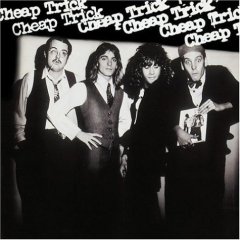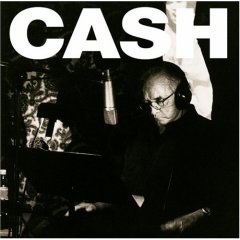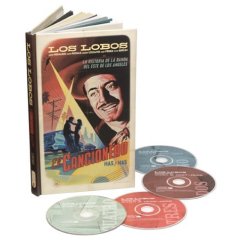
The year is 1977. The most popular thing going, musically, is disco; the punk 'revolution' has already started to crumble under it's own weight, and rock 'n' roll has sold its soul to the corporations. Then, thrown into the middle of all this is the first album from one of the most interesting American bands ever formed. Founded in Rockford, Illinois in the early seventies,
Cheap Trick is a strange beast. Drawing on his past experience in other bands,
Rick Nielsen finally decided to form his own group. His band, he decided, would be made up of the absolute best instrumentalists he could find. Enter
Bun E Carlos (drums),
Tom Petersson (bass) and
Xeno Hogan (vocals). Xeno? Well, it turns out that Xeno was a mistake, his heart was not in playing rock 'n' roll, he just wanted to meet chicks. Exit Xeno, enter
Robin Zander (vocals). Now, this was a band to be proud of. After playing whenever and wherever they could for a few years (one of my best friends has a picture of them playing at his high school prom), they were finally asked to step into a studio and make an album. That album was
Cheap Trick.
Everything about this band was different. Where punk was going so far out of its way to be the antithesis of radio-rock, and was becoming a self-parody as a result, and 'regular' rock was becoming ever more bombastic and boring,
Cheap Trick took elements of both and became neither. They took the over the top showmanship of "stadium rock" (these guys looked like living cartoon characters), the instrumental prowess of "progressive rock" and the power and attitude of "punk rock." Their songs are pure fun, and in these early days sometimes even contained powerful messages. Their style was pure adrenelin fueled rock 'n' roll. As an introduction to the band, their first album was perfect.
Opening with
ELO Kiddies the album roars into life with a lopsided drum part that trots along a few bars before being joined by a guitar and a... phone... ? The guitar merrily trails along with the drums for a few bars while the phone rings, and rings, and rings in the background. Soon, the bass joins in on the merry trip. This is music to skip to, which is exactly what Nielsen does when playing this song on stage. Finally, the vocalist jumps into the fray, "'ello kiddies, 'ello kiddies what you gonna do when the lights start shining? / ello kiddies, 'ello kiddies what you gonna do when your head's exploding?" This is a song about growing up. As he sings, Zander's tone is mocking, containing the line "You know school's for fools" sung with such bitterness that you know Zander is zeroing in on the kids that would rather party than learn. Immediately, you know this band is not your typical band. As the song progresses, the momentum builds, sound effects whip in and out, the drums become more furious, less about keeping the beat and more about accenting the attitude. And then, with a final scream from Zander, it's all over. There is only a few seconds respite though, because the next song
Daddy Should Have Stayed In High School, pick up right where the previous song ends. Opening with a brief bass guitar flourish, the lead guitar soon joins in. In the background, children can be heard playing on a playground. This song rolls along, quoting
Chuck Berry's Reelin' and Rockin' as it goes. Special effects are all over this number, as voices are phase-shifted, drums are distorted and odd sounding guitar flourishes zoom from speaker to speaker. I think there's even a kazoo in there somewhere. It's hard to tell with all the noises laid on top of this track. This is definitely a headphone song.
Taxman will seem familiar to any
Beatle fan that hears it. no, it is not the song written by
George Harrison and released on their
Revolver album, although it quotes it several times, both musically and lyrically. Rick Nielsen penned this track, like most of the band's material. By the time it wound up on this album, this song had been a Cheap Trick staple for years, but not in this arrangement. According to Nielsen, the band was constantly being compared to the Beatles, so this song was rearranged to play up the resemblance. The result is the most overtly Beatles-sounding track Cheap Trick ever recorded. But, this is the Beatles with their amps turned up to eleven! The next track
Cry, Cry is the closest Cheap Trick ever came to playing pure blues. Much like the previous track, though, this is blues with the amps turned up to eleven. Nielsen plays blues licks during the song, but he also mixes in his typical
Pete Townshend style power chording, jerking the song back and forth between pure blues styling and the band's typical hook-laden power pop.
Oh Candy is a powerful anti-drug song written for one of the band's roadies who had recently died of a heroin overdose. Over a driving guitar/bass bed the singer simply asks why the victim never tried to get help until it was too late.
Hot Love returns the band to more familiar ground. A full-out, high-speed rocker whose topic is exactly what the title implies it will be about. Great music, trite lyrics is a description that pretty much sums up this track.
The band follows up this mis-step with one of the most powerful numbers on the album.
Speak Now Or Forever Hold Your Peace is a long, instrumental showcase. Opening with Tom Petersson's thundering bass, the other instruments join one at a time, until the entire band thunders through five minutes of almost simultaneous soloing. The title is clichéd, but it is also a joke. The lyrics are inconsequential, more an excuse for Zander to show why he's known as "the man of 1,000 voices" than to actually have any meaning. During concerts, the band has been known to stretch this song out to fifteen minutes. That kind of treatment suits this song. Even at five minutes it seems like it's just getting started as it crashes to a halt.
He's a Whore is about selling out. The singer goes through all the things he can do with the money he would do with the money he could make by selling out. Revealing the entire scenario is just a daydream, several times the singer moves from chorus to verse with the tag "And so the story goes..." The music is driving and heavy, pushing Zander to sing the lyrics so fast they sometimes stumble over themselves coming out of his mouth, as if he's so excited by his dream that he can barely contain it. This is a very effective song, and quite a contrast to the one following.
Mandocello is named after an instrument Rick Nielsen found in his father's music shop. It is a combination of Mandolin, Cello, and piano, and according to Nielsen there are only half a dozen left in existence. Using that instrument as a backdrop, the song is a mid-tempo love song in which the singer tells his lover, "Look at me, like I look at you / think of me, like I think of you / speak to me, like I spoke to you / dream of me, how I dream of you." This song deftly shows another side of Zander's vocal ability, that of pop crooner, as he deftly flies above the instrumentation, reining the song in whenever it threatens to become too thunder out of control.
The Ballad of TV Violence is a scary song. It's the type of song that will give you nightmares. Originally entitled
The Ballad of Richard Speck the band decided to change the name at the last minute because they did not want to look to be celebrating a man who did not deserve celebrating. Containing such frightening lyrics as "I need a knife to get me a wife," the song definitely sows seeds of being an uncomfortable listening experience. As the song crashes to and end, though, with Zander screaming his lungs out over a thunderous guitar/bass crescendo, the truth wins out. The song, like the man it was originally named after, is a monster, and it is put out of its misery with a single gunshot.
The original album ended here, the remastered version has several bonus tracks, including a version of
I Want You To Want Me recorded during the sessions for this album. As with all the other studio versions of this song, this one is weak. The muscle and power of the live reading is completely missing. While it is an interesting curiosity, it is clear why the band saved it for a later album. There is also an early version of
You're All Talk that is much more powerful than the later recorded, and released, version. This recording is faster than the later recording, and is pushed along by a booming, extremely loud, bass drum, which keeps a steady 4/4 beat.
Lovin' Money is another bonus track. This one finds the singer wondering why everybody else seems to have a better life than he does.
I Dig Go-Go Girls closes the remastered version of this album on a comedic note. It is an inconsequential, albeit hilarious, tune about, well, about exactly what the title implies.
Taken as a whole, this album is a lot of fun, and a perfect introduction to Cheap Trick. It contains examples of their instrumental prowess, their comedic value, their ability to rock the house while still teaching important lessons (sadly, a style they would turn their back on in later years, when in search of that ever elusive "hit".) This album is loud, bombastic, obnoxious, scary, and very, very funny. It is a great introduction to a great band.
Song List
1. ELO Kiddies
2. Daddy Should Have Stayed In High School
3. Taxman, Mr. Thief
4. Cry, Cry
5. Oh, Candy
6. Hot Love
7. Speak Now Or Forever Hold Your Peace
8. He's A Wh*re
9. Mandocello
10. Ballad Of TV Violence (I'm Not The Only Boy), The
11. Lovin' Money - (outtake)
12. I Want You To Want Me - (outtake)
13. Lookout - (previously unreleased, outtake)
14. You're All Talk - (previously unreleased, outtake)
15. I Dig Go-Go Girls - (previously unreleased, outtake)






